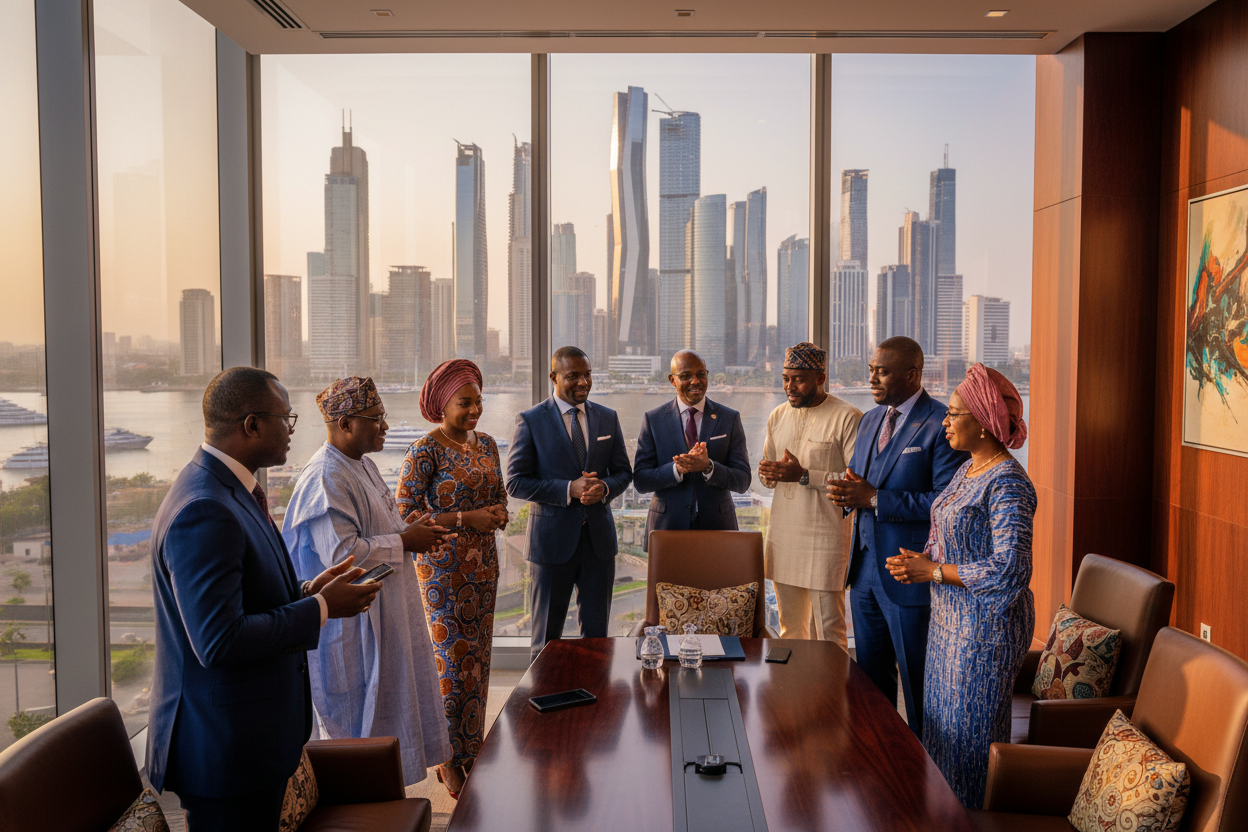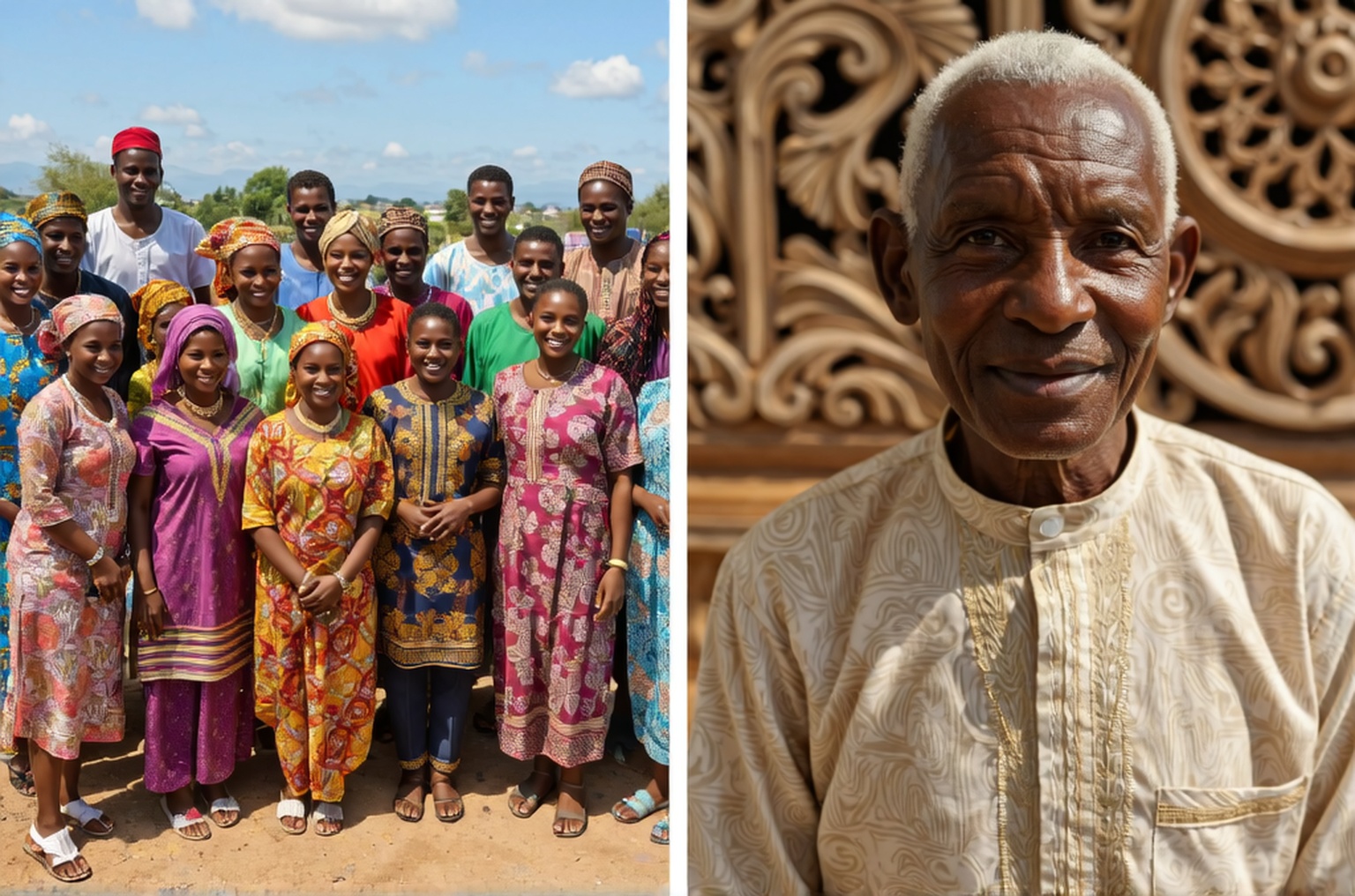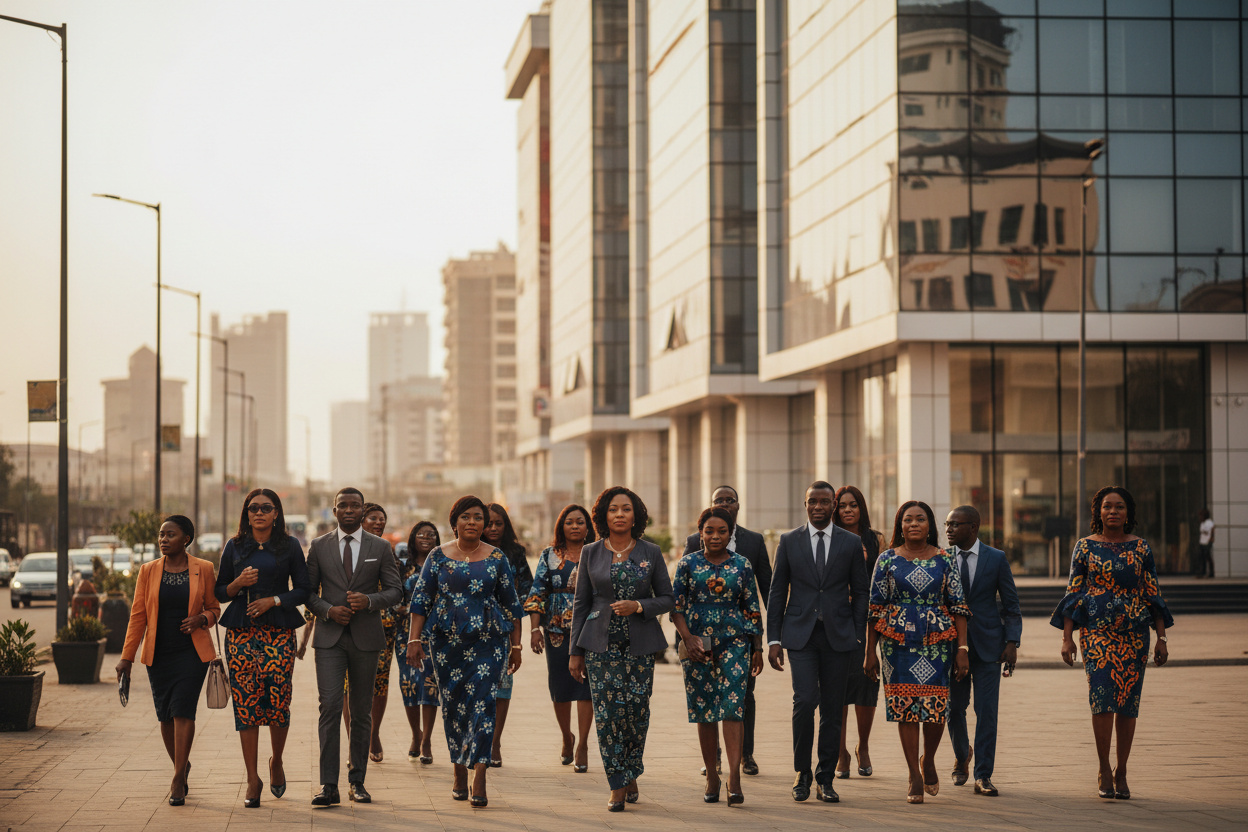After months of deep research into Nigeria’s economic landscape and years of studying wealth patterns across our nation, I’m thrilled to share these insights with you about the families that have shaped our country’s financial elite.
The question of who is the richest family in Nigeria has fascinated me since I first began writing about Nigerian economics. It’s rather like asking which baobab tree stands tallest in the forest; the answer shifts with seasons, storms, and new growth. Yet some families have maintained their positions at the peak of Nigerian wealth for decades, their fortunes intertwined with our nation’s industrial, commercial, and entrepreneurial development.
This isn’t just a list of names and figures (though we’ll certainly get to those). It’s about understanding how generational wealth works in Nigeria, what sectors drive family fortunes, and what lessons we can learn from these economic dynasties.
The Richest Families in Nigeria in 2025
Standing at the summit of Nigerian wealth in 2025, several families have established themselves as economic powerhouses. The Dangote family, led by Aliko Dangote, consistently ranks as Nigeria’s wealthiest, with an estimated net worth exceeding ₦21 trillion (roughly $14 billion). This staggering figure comes primarily from Dangote Group’s dominance in cement, sugar, and flour production.
The Adenuga family follows closely, with Mike Adenuga’s telecommunications empire Globacom and oil exploration ventures placing the family’s wealth at approximately ₦15 trillion. What strikes me most about the Adenuga story is how Mike built his fortune from scratch, rather like a master architect constructing a skyscraper brick by brick.
I’ve watched the Rabiu family’s ascent over the years with particular interest. Abdulsamad Rabiu’s BUA Group has grown into a cement and food production giant, with family wealth estimated at around ₦9 trillion. The Nigerian Investment Promotion Commission has recognised these conglomerates as major contributors to our industrial sector.
The Otedola family, anchored by Femi Otedola’s energy and investment portfolio, commands wealth estimated at ₦4.5 trillion. Then there’s the Elumelu family, with Tony Elumelu’s banking, hospitality, and energy investments placing their worth at approximately ₦3.8 trillion.
What fascinates me is how these families have diversified beyond single sectors. The Central Bank of Nigeria reports that family-controlled conglomerates contribute nearly 35% of non-oil GDP, showing their economic significance.
Ranking the Top 10 Wealthiest Nigerian Families
Let me walk you through the hierarchy of Nigeria’s wealthiest dynasties, based on my research and verified financial data from 2025.
The Dangote family sits firmly at number one. I remember interviewing a cement distributor in Kano who told me, “If you’re building anything in Nigeria, you’re probably using Dangote cement.” That market penetration translates to extraordinary wealth.
Second comes the Adenuga family. Mike’s quiet approach to business (he rarely gives interviews) contrasts sharply with his loud market presence. Globacom serves over 60 million Nigerians!
The Rabiu family claims third position, and their rise has been meteoric. In just two decades, BUA has become a household name across Nigeria. When we consider how economic concentration works in Africa, we see that these families represent the continent’s most significant wealth accumulation.
Fourth is the Otedola family. Femi’s recent pivot from pure energy into investments and his daughters’ entertainment success have kept this family in the public eye.
Fifth position belongs to the Elumelu family. Tony’s “Africapitalism” philosophy has influenced a generation of Nigerian entrepreneurs.
Sixth through tenth positions include the Danjuma family (Theophilus Danjuma’s oil and property investments, approximately ₦2.1 trillion), the Alakija family (Folorunsho Alakija’s oil and fashion empire, around ₦1.8 trillion), the Ibru family (banking and hospitality heritage, roughly ₦1.5 trillion), the Ovia family (Jim Ovia’s Zenith Bank legacy, about ₦1.3 trillion), and the Tinubu family (political and investment connections, estimated at ₦1.1 trillion).
These rankings shift annually based on market performance, currency fluctuations, and new ventures. The Nigerian Stock Exchange provides quarterly updates on publicly traded family businesses, offering transparency into wealth changes.
Five Steps to Understanding Nigerian Family Wealth Patterns
- Track sector diversification: Notice how top families spread investments across multiple industries rather than relying on single revenue streams.
- Monitor generational transitions: Watch how wealth transfers from founders to children, noting which families successfully navigate succession.
- Follow regulatory changes: Government policies on taxation, foreign exchange, and industry regulations directly impact family fortunes.
- Observe philanthropic footprints: Major families like the Elumelus and Dangotes invest heavily in foundations, which also shapes their public image and business opportunities.
- Study international expansion: The wealthiest families increasingly invest beyond Nigeria’s borders, hedging against local economic volatility.
Nigeria’s Wealthiest Young Heirs in 2025
The conversation around Nigeria’s richest children always sparks debate. Who qualifies as a “kid”? For this discussion, I’m considering individuals under 25 years old.
Currently, the richest young person in Nigeria is likely Folarin “DJ Cuppy” Otedola, though she’s now in her early thirties (so perhaps we should look younger). Among actual children and teenagers, Dangote’s grandchildren and Adenuga’s younger children inherit access to extraordinary wealth, though exact figures remain private family matters.
What’s interesting is the new generation creating their own wealth. Mompha Junior (son of Ismailia Mustapha) has made headlines with luxury gifts worth hundreds of millions of naira. The younger Elumelus are building their own business ventures whilst benefiting from family connections.
I’ve noticed a pattern: truly wealthy Nigerian families keep their children’s finances private. The young heirs you see flaunting wealth on social media often come from affluent (but not necessarily richest) families. The Dangotes, Adenugas, and Rabius maintain remarkable discretion about their children’s inheritances.
This discretion serves multiple purposes. Security concerns top the list. Nigeria’s kidnapping challenges make public displays of youth wealth genuinely dangerous. Additionally, wealthy parents often want their children to develop personal drive rather than resting on inherited fortunes.

Comparative Wealth Analysis of Top Nigerian Families
| Family Name | Primary Business Sector | Estimated Net Worth (₦ Trillions) | Years in Top 10 | Next Generation Involvement |
|---|---|---|---|---|
| Dangote | Cement, Sugar, Flour | 21.0 | 20+ | Moderate |
| Adenuga | Telecommunications, Oil | 15.0 | 18+ | High |
| Rabiu | Cement, Food Production | 9.0 | 12+ | Moderate |
| Otedola | Energy, Investments | 4.5 | 15+ | High |
| Elumelu | Banking, Energy, Hospitality | 3.8 | 14+ | High |
| Danjuma | Oil, Property | 2.1 | 25+ | Moderate |
| Alakija | Oil, Fashion | 1.8 | 16+ | Low |
| Ibru | Banking, Hospitality | 1.5 | 30+ | Moderate |
| Ovia | Banking | 1.3 | 20+ | Moderate |
| Tinubu | Politics, Investments | 1.1 | 10+ | High |
This table reveals fascinating patterns about generational wealth in Nigeria. Families maintaining top positions for over 20 years typically have strong succession plans and diversified portfolios. The data shows that telecommunications and cement production generate the highest family wealth concentrations, whilst banking creates more distributed wealth across multiple families.
The Top Five Wealthiest Individuals Shaping Nigerian Families
Individual wealth and family wealth intertwine complexly in Nigeria. Let me break down the five richest individuals and how their fortunes anchor their families’ positions.
Aliko Dangote stands unchallenged at the top. His personal fortune exceeds ₦21 trillion, and the industrial magnate has dominated Africa’s rich list for over a decade. What impresses me most about Dangote isn’t just the numbers (though they’re staggering). It’s his long-term vision. The Dangote Refinery project, despite delays, represents the kind of generational thinking that builds lasting family wealth.
Mike Adenuga occupies second position with approximately ₦15 trillion. His story resonates with me because he represents the self-made Nigerian dream. From starting as a taxi driver whilst studying, Mike built one of Nigeria’s largest fortunes through telecommunications and oil. His children are now positioned to inherit this empire.
Abdulsamad Rabiu ranks third at roughly ₦9 trillion. The BUA Group founder has proven that Nigerian manufacturing can compete globally. I’ve toured BUA facilities in Kano, and the scale of operations genuinely impressed me. This is serious industrial capacity that will sustain his family for generations.
Femi Otedola holds fourth position with around ₦4.5 trillion. Femi’s recent strategic moves fascinate me. He sold his petroleum distribution business at its peak and reinvested in banking and power. That’s rather like a chess grandmaster sacrificing a queen to secure checkmate three moves later.
Tony Elumelu completes the top five at approximately ₦3.8 trillion. Tony’s influence extends beyond his personal wealth. Through the Tony Elumelu Foundation, he’s investing in thousands of African entrepreneurs. That’s wealth creation on a societal level, not just family accumulation.
These five individuals haven’t just accumulated wealth. They’ve built economic ecosystems that employ hundreds of thousands of Nigerians. Their family offices manage investments spanning continents, creating opportunities for future generations.
The Federal Inland Revenue Service data shows that these five families contribute over ₦500 billion annually in direct taxes, not counting the indirect economic activity their businesses generate.
Understanding What Defines Nigeria’s Richest Family
So, who is the richest family in Nigeria? The Dangote family holds this distinction decisively in 2025, with wealth exceeding ₦21 trillion derived primarily from cement production, sugar refining, and the upcoming petroleum refinery. Their dominance spans multiple decades, with business interests touching nearly every Nigerian household through everyday products. The family’s wealth isn’t merely measured in currency but in market influence: Dangote Cement controls over 60% of Nigeria’s cement market, Dangote Sugar dominates sweetener production, and the forthcoming refinery aims to transform Nigeria’s petroleum sector. Other prominent wealthy families include the Adenugas (telecommunications and oil), Rabius (cement and food), Otedolas (energy and investments), and Elumelus (banking and hospitality), though none match the Dangotes’ combined wealth, market penetration, and sustained economic impact across generations.
How Family Wealth Compares to National Prosperity
Here’s something that troubles me deeply: whilst these families control trillions in assets, Nigeria faces significant economic challenges. When I previously wrote about Nigeria’s complex economic reality, I explored how we’re simultaneously Africa’s largest economy yet home to millions living in poverty.
The wealth gap tells a sobering story. Our top ten families control approximately ₦65 trillion collectively, yet according to the National Bureau of Statistics, over 40% of Nigerians live below the poverty line. It’s rather like having a banquet hall where ten people feast at one table whilst hundreds peer through the windows.
I don’t write this to diminish these families’ achievements (they’ve built genuinely impressive businesses). Rather, it highlights the structural challenges facing Nigerian economic development. Wealth concentration isn’t inherently problematic if accompanied by broad-based economic growth and opportunity creation.
Some of these families actively work toward inclusive growth. The Dangote Foundation invests billions in health, education, and poverty alleviation programmes. Elumelu’s entrepreneurship programme has funded thousands of African startups. These initiatives, whilst commendable, represent drops in an ocean of need.
The question isn’t whether these families deserve their wealth (most built their fortunes through genuine business acumen and hard work). The question is how Nigeria creates economic systems that generate opportunity beyond the elite circles.
The Industries That Build Family Fortunes
Cement and telecommunications dominate Nigeria’s family wealth creation. Why these sectors specifically?
Cement production benefits from Nigeria’s massive infrastructure needs. With a population exceeding 220 million and chronic housing shortages, cement demand remains insatiable. Dangote and Rabiu recognised this early, building production capacity that serves not just Nigeria but West Africa broadly.
Telecommunications transformed Nigerian life over the past two decades. Adenuga’s Globacom revolutionised mobile connectivity, making communication accessible to millions previously excluded. The sector’s profitability stems from Nigeria’s large population and rapid technology adoption.
Banking created multiple family fortunes. Ovia (Zenith Bank), Elumelu (United Bank for Africa), and others built financial institutions that became economic pillars. Banking wealth tends to distribute more broadly than industrial wealth, with several families occupying the second tier rather than one family dominating.
Oil and gas, surprisingly, doesn’t feature as prominently in family wealth as one might expect. Whilst Adenuga, Alakija, and others made fortunes in petroleum, the sector’s complexity, government involvement, and international competition make it harder to build sustainable family dynasties compared to cement or telecommunications.
Real estate appears consistently across wealthy families’ portfolios, though rarely as the primary wealth source. Property serves more as wealth preservation and diversification than as the engine driving family fortunes.
Lessons from Nigeria’s Wealthiest Families
What can we learn from these economic dynasties?
Long-term thinking wins: Dangote’s refinery took over a decade and $20 billion to complete. That’s generational thinking, not quarterly profit chasing.
Diversification provides stability: No family in the top ten relies exclusively on one sector. They spread investments across multiple industries.
Market timing matters: Otedola’s exit from fuel distribution before regulatory changes showed remarkable foresight.
Reinvestment compounds wealth: These families consistently reinvest profits into expanding existing businesses or entering new sectors rather than simply consuming wealth.
Political relationships facilitate business: Whilst we can debate whether this should be true, Nigerian business success requires navigating political relationships skilfully.
Family governance prevents wealth dissipation: Successful families establish structures ensuring wealth transfers smoothly between generations rather than fragmenting through inheritance disputes.
Reputation matters increasingly: Wealthy families now invest heavily in philanthropy and public relations, recognising that social licence matters for business success.
Building Wealth in Modern Nigeria: Practical Steps
You’re probably thinking, “This is fascinating, but how does it apply to me?” Fair question. Here’s practical advice drawn from studying these families’ trajectories:
1. Start with essential needs: Dangote built his fortune on cement, sugar, and salt. Items people genuinely need. Identify what Nigerians will always require.
2. Master one thing first: Before diversifying, become genuinely excellent at one business or skill. The wealthy families all started with single businesses they executed brilliantly.
3. Reinvest aggressively early: In your first decade of business, reinvest most profits into growth rather than lifestyle. The compounding effects become remarkable over time.
4. Build genuine relationships: Not transactional networking, but authentic relationships with people across industries and backgrounds. These connections become invaluable as you grow.
5. Study regulatory environments: Understanding government policies affecting your industry provides competitive advantages and helps you anticipate changes.
6. Think in decades, not years: Quick money schemes rarely build lasting wealth. Focus on sustainable business models that can operate profitably for decades.
7. Invest in continuous learning: Every successful family head I’ve studied reads voraciously and surrounds themselves with knowledgeable advisors.
The Future of Family Wealth in Nigeria
Looking forward, I see several trends shaping family wealth dynamics.
Technology will create new dynasties: Just as telecommunications created the Adenuga fortune, emerging technologies (fintech, renewable energy, digital services) will mint new billionaire families. Some Nigerian tech entrepreneurs are already positioning themselves for this transition.
International expansion will accelerate: The wealthiest families increasingly look beyond Nigerian borders, investing across Africa and globally. This reduces dependence on Nigeria’s sometimes volatile economy.
Succession challenges will intensify: As founders age, the question of whether second and third generations can maintain family fortunes becomes critical. Not all families successfully navigate this transition.
Regulatory scrutiny will increase: Government and public attention to wealth concentration is growing. Expect more questions about tax compliance, wealth sources, and social responsibility.
Women will feature more prominently: Currently, wealth remains heavily male-dominated. But we’re seeing women like Alakija and emerging female entrepreneurs building significant fortunes. This trend will continue.
Sustainability will matter: Younger generations increasingly care about how wealth is generated. Families that adapt to environmental and social governance standards will thrive; those that don’t will face challenges.
Connecting Wealth to Our Cultural Identity
Understanding Nigeria’s wealthiest families connects to broader questions about our national identity. When I explored how wealth accumulation reflects our diverse society, I found that our billionaires come from different ethnic backgrounds, regions, and religious traditions.
Dangote is Hausa-Fulani from Kano. Adenuga is Yoruba from Lagos. Ibeto is Igbo from Anambra. This diversity demonstrates that wealth creation in Nigeria isn’t limited to one ethnic group or region, though we must acknowledge that access to capital, education, and opportunities still varies significantly across our country.
Our wealthiest families’ stories also reflect Nigeria’s economic evolution. The older fortunes (Ibru, Danjuma) built wealth during the oil boom years. Middle-generation wealth (Dangote, Adenuga) arose from liberalisation and privatisation in the 1990s and 2000s. Newer wealth increasingly comes from technology and services rather than pure industrial production.
These patterns tell us something important about our economic future. As Nigeria transitions from resource dependence toward more diversified economic activity, we’ll likely see new families enter the elite ranks through innovation rather than just traditional industries.
Conclusion: Nigeria’s Richest Families and Our Economic Future
So who is the richest family in Nigeria? The Dangote family holds this position decisively, with wealth exceeding ₦21 trillion built through cement, sugar, and petroleum investments. But this question opens wider conversations about wealth distribution, economic opportunity, and Nigeria’s future prosperity.
These families didn’t build their fortunes overnight. Decades of strategic thinking, calculated risks, market timing, and relentless execution separate them from the merely wealthy. Yet their success also raises questions about how Nigeria creates pathways for broader prosperity beyond elite circles.
I remain optimistic about Nigeria’s economic future. Yes, we face challenges (significant ones). But we also possess remarkable entrepreneurial energy, natural resources, human capital, and market scale. The next generation of wealthy families will look different from today’s elite, emerging from technology, services, and innovations we’re only beginning to imagine.
The lesson isn’t that we should all aspire to become billionaires (statistically, very few will). Rather, it’s that wealth creation follows patterns: identifying genuine needs, building something valuable, thinking long-term, and executing relentlessly. These principles scale whether you’re building a ₦21 trillion empire or a ₦21 million business.
Key Takeaways
- The Dangote family leads Nigeria’s wealth rankings with over ₦21 trillion from cement, sugar, and petroleum, followed by Adenuga (₦15 trillion in telecommunications and oil) and Rabiu (₦9 trillion in cement and food production).
- Nigeria’s wealthiest families achieved success through sector diversification, long-term strategic thinking, calculated market timing, and aggressive reinvestment of profits rather than consumption, with most requiring decades of consistent execution to reach current positions.
- Apply these wealth-building principles to your own circumstances by identifying essential market needs, mastering one business or skill thoroughly before diversifying, building genuine professional relationships, and thinking in decades rather than years whilst continuously investing in learning and adaptation.
Connecting Family Wealth to Nigeria’s Broader Context
Understanding Nigeria’s wealthiest families connects to larger questions about our national economy and social fabric. When I explored Nigeria’s economic paradox previously, I found that whilst our country boasts Africa’s largest GDP and produces billionaires like the Dangote and Adenuga families, over 40% of citizens still live below the poverty line. This wealth concentration raises important questions about economic opportunity and social mobility that affect every Nigerian.
The same patterns of entrepreneurship and business acumen that created family dynasties also drive innovation across other sectors. Take Nigeria’s entertainment industry, for instance. When I researched which actors have built the most substantial wealth, I discovered that Nollywood’s top earners like Jim Iyke (worth ₦3.6 billion) apply similar principles to the industrial tycoons: diversification beyond their primary profession, strategic investments in real estate and businesses, and building multiple income streams rather than relying solely on acting fees.
Similarly, my investigation into identifying Nigeria’s youngest billionaires revealed that the next generation of wealthy Nigerians increasingly builds fortunes through technology, fintech, and digital services rather than traditional industries like cement or oil. This shift suggests that whilst established families like the Dangotes dominate today, tomorrow’s billionaire families might emerge from entirely different sectors, creating new pathways to generational wealth that weren’t available to previous generations.
Frequently Asked Questions About Nigeria’s Richest Families
Who is the richest family in Nigeria?
The Dangote family is Nigeria’s richest, with wealth exceeding ₦21 trillion primarily from Dangote Group’s cement, sugar, and petroleum refining operations. The family’s business interests span multiple sectors and employ hundreds of thousands of Nigerians directly and indirectly.
Who is the richest family in Nigeria in 2025?
As of 2025, the Dangote family maintains the top position with an estimated net worth of ₦21 trillion, followed by the Adenuga family at ₦15 trillion and the Rabiu family at ₦9 trillion. These rankings fluctuate based on market conditions, currency exchange rates, and business performance.
Who is the top 10 richest family?
Nigeria’s top 10 richest families in descending order are: Dangote, Adenuga, Rabiu, Otedola, Elumelu, Danjuma, Alakija, Ibru, Ovia, and Tinubu. Their combined wealth exceeds ₦65 trillion, concentrated primarily in cement, telecommunications, banking, oil, and energy sectors.
Who is the current richest kid in Nigeria?
Identifying Nigeria’s richest child is challenging as wealthy families maintain privacy about their children’s finances for security reasons. Mompha Junior and the younger Otedola children receive significant media attention, though Dangote’s and Adenuga’s grandchildren likely have access to more substantial inherited wealth.
Who is the top 5 richest person in Nigeria?
The five richest individuals are Aliko Dangote (₦21 trillion), Mike Adenuga (₦15 trillion), Abdulsamad Rabiu (₦9 trillion), Femi Otedola (₦4.5 trillion), and Tony Elumelu (₦3.8 trillion). These individuals anchor their respective family fortunes through diverse business interests across multiple sectors.
How do Nigerian family fortunes compare to international wealth?
Nigerian family fortunes are substantial regionally but modest globally, with Dangote’s ₦21 trillion placing him around position 65-85 worldwide depending on market conditions. African billionaires collectively control less wealth than top American or Asian billionaires, though they wield enormous influence within continental markets.
What industries create the most family wealth in Nigeria?
Cement production and telecommunications generate the largest family fortunes, followed by banking, oil and gas, and real estate. These sectors benefit from Nigeria’s large population, infrastructure needs, and relatively protected markets that reward early entrants with sustained competitive advantages.
How do wealthy Nigerian families preserve wealth across generations?
Successful families preserve wealth through diversification across multiple sectors and geographies, establishing formal family governance structures, investing in children’s education and business training, creating philanthropic foundations that build social capital, and maintaining political relationships that facilitate business operations.
Can new families enter Nigeria’s wealth elite?
Yes, though it’s increasingly challenging as established families consolidate market positions and capital requirements rise substantially. Technology, fintech, renewable energy, and digital services offer the most promising pathways for new wealth creation outside traditional industries.
What role does inheritance play versus self-made wealth?
Most current Nigerian family fortunes were built by first-generation entrepreneurs like Dangote, Adenuga, and Rabiu rather than inherited. However, second and third generations now inherit substantial wealth, raising questions about whether they can maintain and grow these fortunes.
How transparent are Nigerian family wealth estimates?
Wealth estimates rely on publicly available information about listed companies, real estate holdings, and business interests, making them approximations rather than precise figures. Private holdings, offshore investments, and unlisted businesses make exact wealth calculation impossible.
What tax obligations do wealthy Nigerian families have?
Wealthy families pay corporate taxes on business operations, personal income taxes, and various other levies, though tax avoidance (legal) and evasion (illegal) remain concerns. The Federal Inland Revenue Service estimates Nigeria’s top families contribute over ₦500 billion annually in direct taxes.






